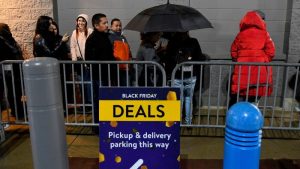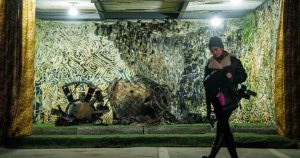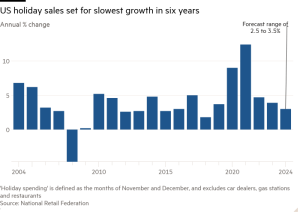‘We want to show we can stand with someone who votes differently’
Unlock the US Election Countdown newsletter for free
The stories that matter on money and politics in the race for the White House
The writer is a contributing columnist, based in Chicago
Peggy Prichard and Jim Mayer hail from opposite sides of America’s political divide. But they stand together on this blustery and anxious election day in the US Midwest, to prove that ordinary Americans can — and must — keep talking to each other, beyond defeat or triumph.
“The whole tribal thing of whipping each other up about the other side is a big problem right now,” says Mayer, 63, the Democrat half of an unlikely red-blue friendship with Prichard, 61, a Republican. Huddled under umbrellas and jointly clutching a sign proclaiming their political truce, they stand shoulder to shoulder outside the polls in Mahomet, a small town in Champaign County, Illinois, that voted for Donald Trump in 2020. The county itself is a blue island in the sea of red which is the central state.
Election day dawned with news of a county-wide network outage that led to voters being turned away from polls — just the kind of problem that could inflame a nervous electorate. But the polls were open again soon after 8am, and the pair set up shop in the pouring rain, where passing voters could not avoid noticing the sign saying: “We’re Red and Blue voters committed to holding America together.” The message appeared to go down well: many waved or smiled, and one gave a vigorous thumbs up (though none braved the deluge to stop and chat).
“The whole point is the visual,” says Mayer, a semi-retired vocational counsellor. “We want to demonstrate that we can stand together, be civil and friendly with someone who votes differently than we do,” he says. Because as Prichard, a newspaper columnist and retired marketing executive, points out: “no matter who wins, someone loses” — and neither side will disappear either way.
Prichard and Mayer belong to Braver Angels, a grassroots group that tries to get Americans talking across the political gulf, “not to change people’s views of issues, but to change their views of each other”. The group tells me that over 100 red-blue pairs went to polling stations across the US this year.
Mayer says stereotyping — by both sides — is a big part of America’s current political dysfunction: “There’s this strong tendency to think all reds think alike or all blues think alike, without speaking with them to know how they really think. It’s the result of living in silos that includes only your own side.” And apparently this political demonisation is getting worse: according to a recent Pew Research Center report, nearly three quarters of Republicans and nearly two-thirds of Democrats think voters on the other side are immoral, compared with about one half and one-third respectively in 2016.
Mayer and Prichard themselves defy these stereotypes. Prichard, though “red”, describes herself as “moderate” with friends on both sides, a conservative daughter and a Democrat son. Mayer, a blue who says he trends to purple, points out he was raised in a Republican household.
Rich London is the “blue” half of a similar pair who stood outside polling stations during North Carolina early voting. He sees strong appetite for the message of depolarisation. “Out of 50 people who went by, all but two were welcoming to the concept of Braver Angels, they felt there is a need in this country to calm things down and for people to talk civilly to one another,” he told me. London, 68, also defies stereotypes: he voted for Donald Trump in 2016, but is now “blue”.
Maury Wilkinson, 68, his “red” polling station partner, says she is “extremely concerned and worried . . . about what will happen if Kamala is elected” — but equally sure the other side is “probably thinking the same thing about Trump”.
Bill Doherty, co-founder of Braver Angels, has warned of the dangers of both victory and defeat. “We can’t get at Harris or Trump, but we can get at the people in our lives who supported them . . . It’s important to avoid that temptation,” he said in a recent online meeting.
Prichard and Mayer have already committed themselves to that. They signed a pledge published in their local newspaper on election day: “Regardless of how the election turns out, I will not hold hate, disdain, or ridicule for those who voted differently from me. Whether I am pleased or upset about the outcome, I will seek to understand the concerns and aspirations of those who voted differently and will look for opportunities to work with people with whom I disagree.” Whatever happens, they will keep talking. Here’s hoping they aren’t the only ones.
#show #stand #votes #differently



